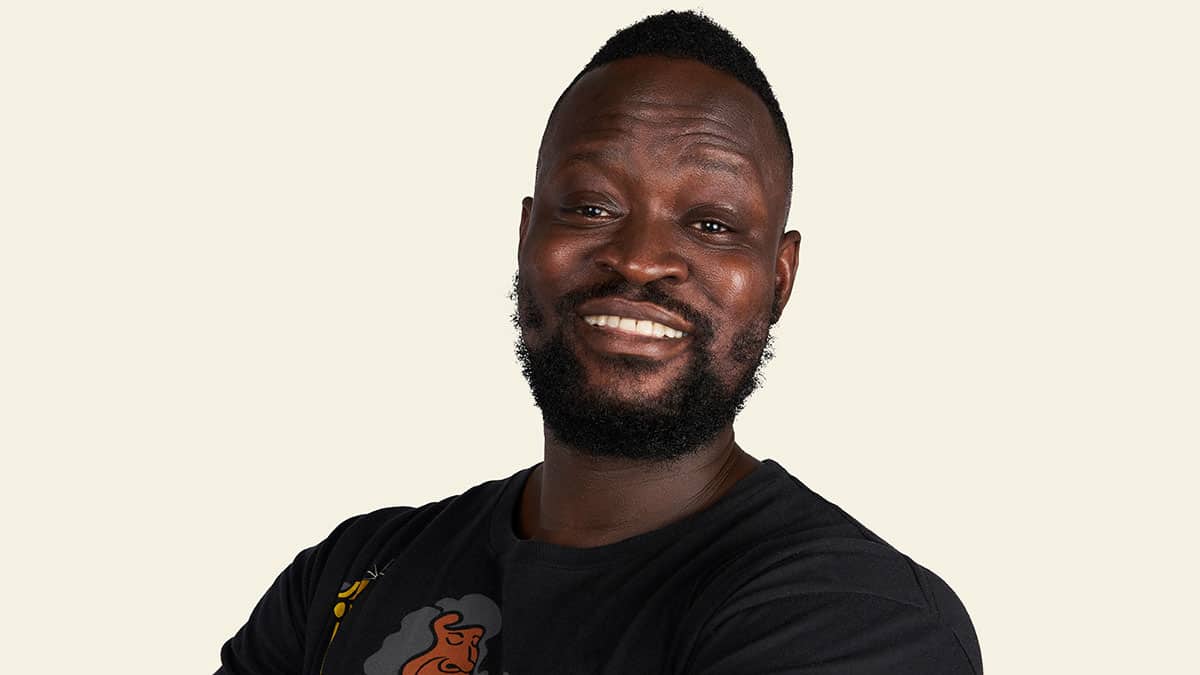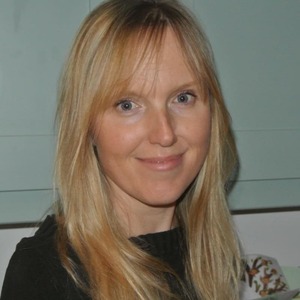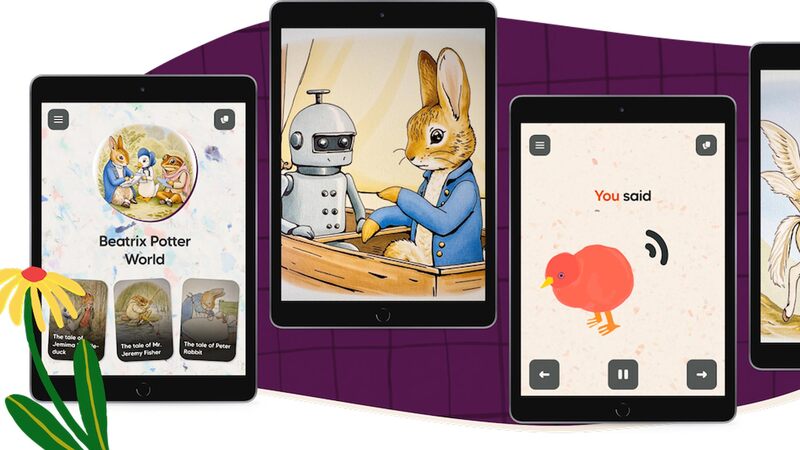You are viewing your 1 free article this month. Login to read more articles.
Dapo Adeola | '[Malorie Blackman] is like the aunt I didn’t even know I had'
Dapo Adeola has collaborated with Malorie Blackman on a future classic – and turned author himself with Hey You!
"She is literally my favourite person in the whole of children’s publishing.” Dapo Adeola is talking about Malorie Blackman, his co-creator on new picture book We’re Going to Find the Monster (published by Puffin in September). His editor Joe Marriott approached Adeola about the project in 2018, before his award-winning début Look Up! had even been published. Talking to me over the phone from his home in Hackney, Adeola admits he was stunned. “Hold on, stop! I’m doing a re-telling of a book for Malorie?” He describes the collaboration as a fantastic experience due to Blackman’s generosity, giving him carte blanche to create characters and being happy to rejig text to make things work. “That’s a rare thing, for someone of her status.” Her support for his efforts in the industry have, he says, been second to none. “She’s like the aunt I didn’t even know I had.”
We’re Going to Find the Monster is a reworking of a 1990s title, Marty Monster, with a revamped text from Blackman and contemporary illustrations by Adeola. The story follows siblings Charlie and Eddie as they become intrepid explorers, journeying over the shimmering ocean, up huge, high mountains, through the deep, dark forest... in search of a monster. The book is a paean to both creativity and family connections: their home is transformed into a wild wonderland by their imagination, and the fearsome monster is actually a rather sleepy big brother. The book is destined to become a family favourite, the rhythmic, repetitive text a treat to read aloud, and the vibrant pages full of visual humour and quirky details to pore over.
The magic of Look Up! was that we had a young Black girl but the story didn’t revolve around her Blackness
Adeola’s first step was to create the characters. “It was important to establish their personalities from the start”, he explains, drawing on his knack for facial expressions and sibling dynamics. “Charlie is the fearless one, younger brother Eddie a little apprehensive.” Early on he made the decision, with Blackman’s approval, that Charlie would have the skin condition vitiligo, going to great lengths to make sure it was accurately depicted. “I made her as fun and vibrant as I could, because people who live with this condition are still people. They are part of the Black diaspora that doesn’t get any sort of front and centre positive limelight.” His next challenge was to put his own stamp on the story. Conjuring the fantastical world was key to this, creating lush landscapes and a plethora of creatures.
Adeola’s publishing journey began in 2015. “I had no intention of going into book illustration,” he laughs, but was approached by his friend Nathan Bryon, who asked him to illustrate a project he was working on. That book became Look Up!; it sold to Puffin in a multi-publisher auction at Bologna Children’s Book Fair in 2017. “It’s been a crazy journey ever since.” At that time, he recalls, the conversation around diversity in publishing was accelerating. “Here we were, two Black men with a Black character... it absolutely made sense. We’ve gone on to prove why it makes sense.” Look Up! won the Waterstones Children’s Book Prize and became a bestseller, the lead character of Rocket in particular resonating with children; Adeola receives Rocket fan art on a daily basis. “The magic of Look Up! was that we had a young Black girl but the story didn’t revolve around her Blackness.”
Other creators of colour have told me of the pressure in becoming the “go-to” name as publishing scrambles to diversify and this is something Adeola strongly identifies with. “I’ve turned down more offers than I’ve had work in the last three years—it’s been insane.” Before Look Up! was published, a Twitter discussion revealed that Ken Wilson Max was the only Black British illustrator in print in the UK. “As much as publishing is a great industry to be part of, it can be supremely lazy,” Adeola says. He began to look for the talent himself, using social media to find and boost other Black illustrators.
Hey You! (out now from Puffin) is a culmination of that talent search, and an emotional response to the events following the murder of George Floyd in 2020. That summer Adeola tweeted that children’s publishing was open to conversations about so many things, “but we never touch on the conversations that Black people have to have with their children”. His editor saw the tweet and commissioned the book. Adeola was initially reluctant—“I’m not an intellectual on race, I just know what I know from my lived experience, what I’ve seen other people go through”—but Marriott convinced him. The project aimed to get as many Black illustrators published as possible, with Adeola making his début as an author. His first draft was, he says, a bit heavier, until his editor asked a question: when was the first time you felt empowered as a Black man? “I had never thought about that before. It was in my twenties. I started thinking what it would have been like if I had felt that at a much younger age.” The book explores the words Adeola wishes he had heard as a child, a lyrical, inspirational message of hope and a celebration of growing up Black.
The book features 18 Black illustrators, showcasing talent and characters from different areas and walks of life: Diane Ewen, Onyinye Iwu, Jade Orlando, Bex Glendining, Derick Brooks, Joelle Avelino, Dunni Mustapha, Kingsley Nebechi, Chanté Timothy, Nicole Miles, Camilla Sucre, Jobe Anderson, Alyssia Johnson, Charlot Kristensen, Sharee Miller, Reggie Brown, Selom Sunu and Gladys Jose. Adeola gave them as much creative space as possible, with his only stipulation that they all used the same colour palette, in order for the book to have a unified feel. Getting all the names on the front cover (very much not the industry standard) was vitally important, achieved with the help of designer Monica Whelan.
The project has given Adeola a sense of agency. “I come from a place where I didn’t think I was going to get this kind of opportunity. Now I’m here, let me see what we can do. I want to be free to tell stories I find interesting, that I think are important. I don’t just want to be grateful for work.”










